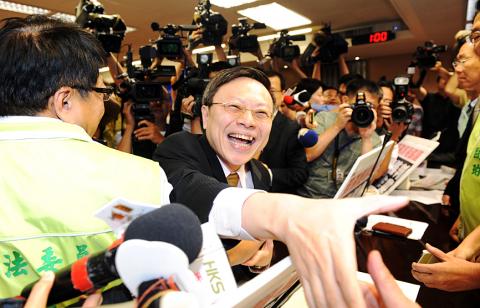|
Legislators stall
cross-strait office draft
NO BLANK CHECK: Opposition lawmakers occupied
the podium and paralyzed the review committee, while KMT lawmakers demanded that
China allow visits to prisoners
By Loa Iok-sin / Staff reporter

Mainland Affairs Council Minister
Wang Yu-chi, center, greets opposition legislators in Taipei as he arrives
yesterday morning at the legislature’s Internal Administration Committee’s
initial review of the establishment of cross-strait representative offices.
Photo: Lo Pei-der, Taipei Times
A draft act to allow Taiwan and China to
establish representative offices in each other’s countries failed to pass its
initial legislative committee review yesterday as opposition parties paralyzed
the Internal Administration Committee meeting, while Chinese Nationalist Party (KMT)
lawmakers also voiced dissatisfaction with the negotiations.
The establishment of representative offices in Taiwan and China will be
addressed in the ninth round of cross-strait talks between the Straits Exchange
Foundation (SEF) and Association for Relations Across the Taiwan Straits (ARATS)
today in Shanghai. The foundation and ARATS will also sign a cross-strait
service trade agreement during the negotiations.
The Internal Administration Committee was at 9am to begin review of legislation
to allow Taiwan and China to create representative offices in each other’s
countries. However, lawmakers from the Democratic Progressive Party (DPP),
Taiwan Solidarity Union and People First Party (PFP) arrived outside the meeting
room at 7am, long before most KMT legislators arrived, at about 8:30am.
As soon as the room’s door was opened, opposition lawmakers rushed to occupy the
podium to prevent the meeting from starting, and they succeeded in stalling the
proceedings all day.
“A few days after a meeting between KMT Chairman Wu Po-hsiung (吳伯雄) and Chinese
President Xi Jinping (習近平) during which Wu and Xi agreed on the ‘one China’
principle and creating representative offices, the government is pushing through
legislation for it,” DPP caucus whip Ker Chien-ming (柯建銘) said of the reason
behind the caucus’ boycott. “However, the Mainland Affairs Council has yet to
brief us on the ongoing talks about creating representative offices, so passing
the legislation now would be like giving it a blank check.”
DPP Chairman Su Tseng-chang (蘇貞昌) also accused President Ma Ying-jeou’s (馬英九)
administration of “asking the Legislative Yuan for a blank check” for the
establishment of cross-strait representative offices before bilateral
negotiations are completed.
It is essential for Taipei to have visitation rights to Taiwanese detained in
China and the authorization to issue travel documents, but the administration
demanded that the legislation be passed without the legislature knowing
Beijing’s position on the matter, which was why the DPP would not accept the
request before the negotiations are completed, Su said.
Meanwhile, the PFP issued a statement saying that while it supports enhancing
cross-strait ties, “we do not agree with President Ma Ying-jeou’s handling of
cross-strait talks, which has made cross-strait exchanges a business of his own
and of his party.”
KMT caucus whip Lai Shyh-bao (賴士葆) condemned the boycott as “unreasonable” and
“irrational,” but added at a separate setting that the KMT caucus was also
dissatisfied that the council is unable to convince China to grant Taipei
visitation rights to Taiwanese detained or jailed in China.
“There are at least 1,000 Taiwanese being detained or imprisoned in China. I
think it’s entirely reasonable to ask China to allow officials from Taiwan’s
representative office in China to visit them,” KMT Legislator Johnny Chiang
(江啟臣) told a press conference at the KMT caucus office in the presence of
Mainland Affairs Council Minister Wang Yu-chi (王郁琦).
“Without the right to humanitarian visits being included in the agreement, the
KMT caucus will not support the draft bill either,” he said.
Wang did not give a firm, positive response.
“We will try our best to secure visitation rights, but I must say that the right
to humanitarian visits is one thing for which Chinese negotiators have not shown
any sign of agreeing to yet,” Wang said. “However, I fully understand the
expectations from the government and from the KMT caucus.”
Ma says the establishment of representative offices for cross-strait exchanges
is crucial and will serve more than 8 million people and facilitate NT$16
million (US$530,000) worth of trade.
“The two sides of the Taiwan Strait will deepen cross-strait exchanges, and it
will be difficult to continue such exchanges without representative offices,” Ma
said yesterday at the KMT headquarters.
Ma, who is also KMT chairman, pledged to enhance cross-strait exchanges if he is
re-elected as the party’s chairman next month, while promising to promote
regional peace in East Asia.
He declined to confirm whether he would visit China in his capacity as KMT
chairman after completing his final term as president in 2016, and insisted that
cross-strait development will continue to move forward.
“We have accomplished great achievements in cross-strait relations over the past
five years and I believe the two sides of the Taiwan Strait cherish such
fruitful results… Cross-strait exchanges will definitely continue to expand and
deepen,” he said.
He said the government would conduct a thorough review of the Act Governing
Relations Between the People of the Taiwan Area and the Mainland Area
(台灣地區與大陸地區人民關係條例) to facilitate cross-strait exchanges.
Additional reporting by Mo Yan-chih and Chris Wang
|
![]()
![]()
![]()